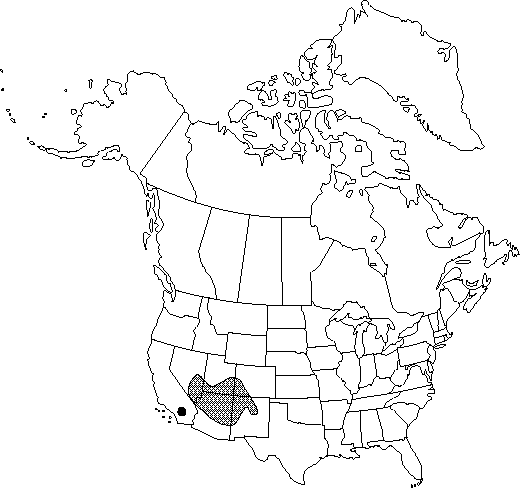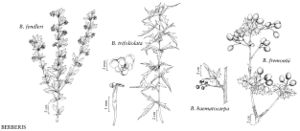Difference between revisions of "Berberis fremontii"
in W. H. Emory, Rep. U.S. Mex. Bound. 2(1): 30. 1859.
FNA>Volume Importer |
FNA>Volume Importer |
(No difference)
| |
Revision as of 22:13, 16 December 2019
Shrubs evergreen, 1-4.5 m. Stems ± dimorphic, with elongate primary and short or somewhat elongate axillary shoots. Bark of 2d-year stems light brown or grayish purple, glabrous. Bud scales 2-4 mm, deciduous. Spines absent. Leaves 5-9(-11)-foliolate; petioles 0.2-0.8(-3) cm. Leaflet blades thick and rigid; surfaces abaxially dull, papillose, adaxially dull, glaucous; terminal leaflet stalked in most or all leaves, blade 1-2.6(-4) × 0.7-1.8(-2.5) cm, 1-2.5 times as long as wide; lateral leaflet blades elliptic to ovate or orbiculate, 1-3-veined from base, base obtuse or truncate, margins strongly crispate, toothed or lobed, with 2-5 teeth 2-6 mm high tipped with spines to 0.8-2.2 × 0.2-0.3 mm, apex obtuse to acuminate. Inflorescences racemose, lax, 3-6-flowered, 2.5-6.5 cm; bracteoles membranous, apex acuminate. Flowers: anther filaments with distal pair of recurved lateral teeth. Berries yellow or red to brown, ± glaucous, spheric, 12-18 mm, dry, inflated.
Phenology: Flowering spring (Apr–Jun).
Habitat: Slopes and flats in desert grassland and pinyon-juniper woodland
Elevation: 1100-2400(-3400) m
Distribution

Ariz., Calif., Colo., Nev., N.Mex., Utah.
Discussion
Berberis fremontii is susceptible to infection by Puccinia graminis.
The Apache Indians used Berberis fremontii for ceremonial purposes; the Hopi used it medicinally to heal gums (D. E. Moermann 1986).
Selected References
None.
